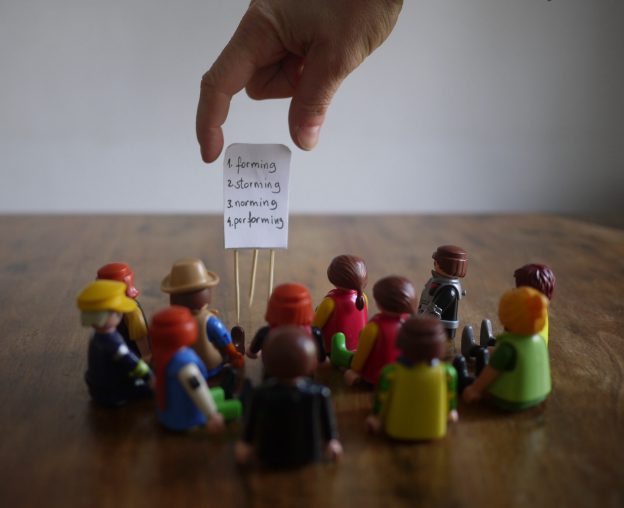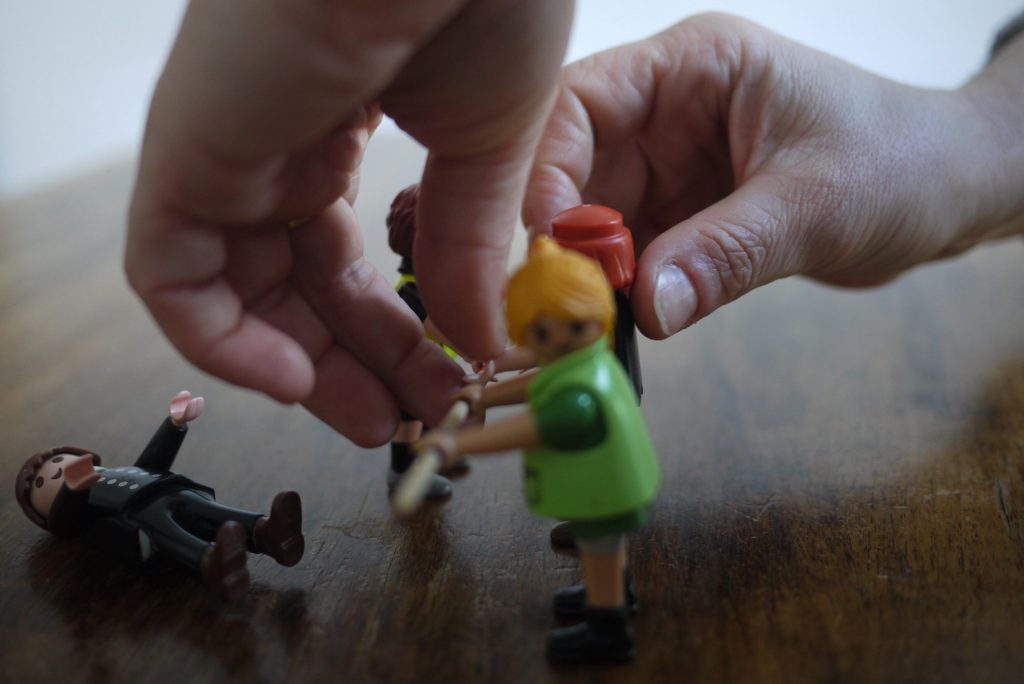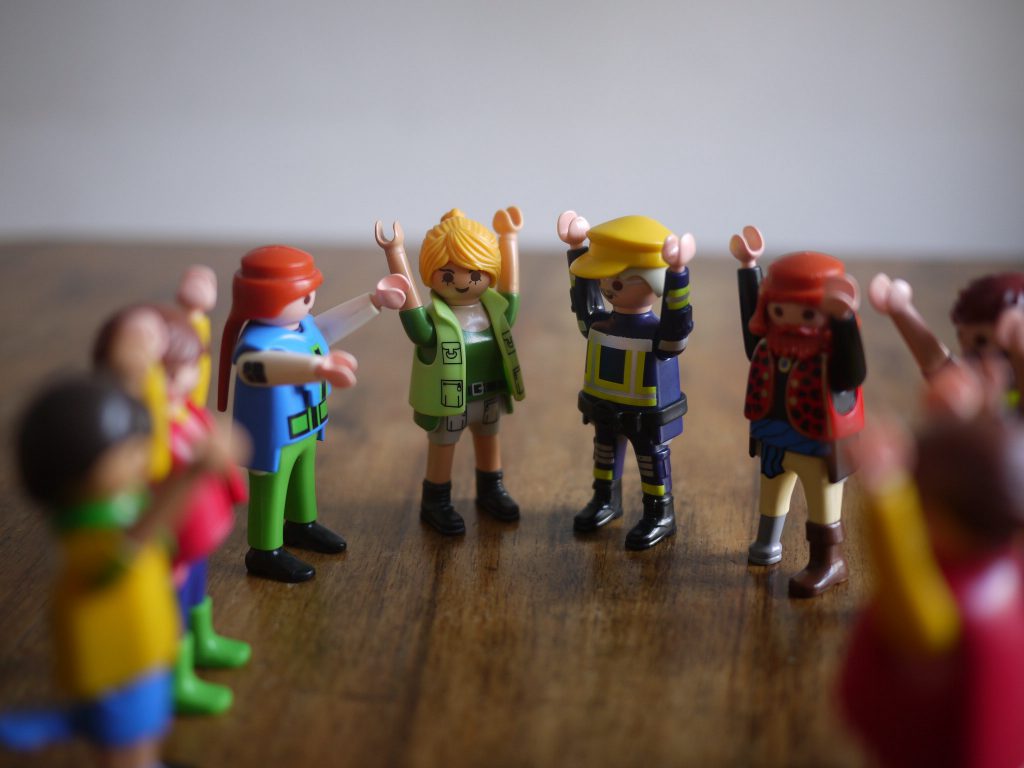
For a long time, our five experts in working with groups went back and forth about whether the meeting they had agreed on months ago should actually take place or whether they wanted to take a break. The reason: all five have not worked with groups in the same room for a long time. Everything happened online!
„The very fact that I now always have to say whether it’s a presence or online, so that people know what’s going on, really annoys me,“ Maria rages to the group. In the end, it turned out that none of colleagues wanted to miss the contact with each other and their meetings. However, two things were agreed in advance – via email – that apply to this date and, until further notice, to all subsequent (online) meetings:
- In analogy to the meetings in local venues, a different platform will be used each time, which will be suggested by one person and tried out beforehand.
- The time spent talking about Corona, home office, online work meetings etc. is limited to a maximum of half an hour at the beginning of the meeting.
Paul has invited the colleagues to „his“ room on wonder.me. He sent them a guest link and now they wander around the room in the form of small circles. To try it out, they also have conversations in pairs or threes, which is possible on this platform, even if they are all in the same virtual room. „I’m in favour of us getting back together now,“ Paul announces and the twosome conversations are brought to an end. Unfortunately, it doesn’t work so well with Rudi, his internet connection doesn’t seem to be able to cope with the abundance of data. He writes in the chat, „I’ll turn off the camera and microphone for now and see if I can at least listen in. If I want to say something, I’ll write it here in the chat. Okay?“. The others agree, although it is clear to everyone, including Rudi, that this is not an ideal solution.
Bursting into the group
„What has been your worst experience so far when working with groups that were already in the middle of a group process?“, Beate introduces today’s topic. „You mean training groups and such, don’t you?“ asks Maria and gets the answer that it is not about teams that spend a lot of time together anyway, but, as suspected, about groups that form a community over a certain period of time, for example in the context of training and further education, and where group dynamic processes can often be strongly observed and felt.
„I really have to tell you something! I had a workshop with a training group at the beginning of autumn and it really didn’t go well! I don’t know exactly what happened, but from the beginning I had the feeling that I didn’t belong there. That made me feel totally insecure and out of sorts. I don’t think I’ve ever been that bad! I already have a stomach ache when I think about what the participants said about me… I’ll never get that job again!“, Paul says so excitedly that he is asked to increase the distance to the microphone a little. Due to his excitement, he emphasised some of the letters very much and this produced ugly noises over the microphone. Later on, the colleagues learn a few details from Paul and Maria and Rudi also report similar experiences when they „burst into“ group processes, at least that’s how it sometimes felt.
Saving the group
Yasemine also shares an experience, but it is quite different: „As I was thinking about our meeting the last few days, I came across a story that happened several years ago. That was also very weird! Some of the participants seemed to fall at my feet halfway through the morning and this intensified during the two days we worked together. I also thought I was doing a good job, but the reactions seemed completely exaggerated and unsettled me because I couldn’t explain what was causing them. In retrospect, I learned some things that have served as explanations for me ever since, even if they are only hypotheses.“ Rudi has become curious and writes in the chat that he would like to know more about what Yasemine learned afterwards. To make Rudi’s participation a little more equal, Yasemine also writes her answer in the chat and for the next few minutes the exchange takes place exclusively there.
In the Chat
Yasemine writes: I learned that the colleagues who had designed the first two modules of the course had a completely different way of working. The participants had experienced them as quite authoritarian. There had been no space to discuss the needs and expectations of the participants. In addition, there was a lot of assessment and the fear of not being good enough had spread through the group. Although „my“ module was already the third, there had not yet been a meeting with the course leader. This should have taken place at the beginning, for a whole day, and was cancelled without replacement due to the illness of the course leader at short notice. It was assumed that the participants would already get in touch if they had any questions or difficulties and that getting to know each other in person during Module 4 would be sufficient.
Rudi writes: Ah, that makes things clearer to me now. They somehow perceived you as a saviour, didn’t they? That perhaps the course will continue in a different atmosphere and with a more appreciative attitude than the first two experiences suggested. Right?
Yasemine: Yes, something like that! I’m switching back to talking, okay? The typing is exhausting me… Sorry!
Rudi: No prob!
Based on the different examples of experience that were contributed, the five experts now compiled points that they consider important when entering into group processes that are already underway as a speaker or trainer. Rudi had agreed to note down the most important points and share them with the others:
- Handovers: Already during the preliminary discussion with the course leader or the clients, clarify which possibilities there are for handing over. This is often done by the course director, who is a link in the communication with the trainers. A direct exchange with colleagues from before and after the course is also useful. It is important to make sure that you do not get „too much“ information. Therefore: Consider in advance what information you would like to have or only pass on the information that is desired. The trainers who come next decide which information is important.
- Interest in previous history: At the beginning of the cooperation, it is helpful to let the participants report on what happened before. This has several functions: It also creates a picture from the participants‘ perspective. I show interest (= appreciation) both for what has already happened and for the participants‘ perspective. I also get a good insight into the group atmosphere during the storytelling process.
- Clarity about the role: As always, it is helpful to be clear about your role. In this case, rather visitor, as far as the group process is concerned. Metaphorically speaking: Visitors do not usually change the set-up or decide when to eat, adaptation to already agreed rules is desirable. At the same time, of course, food can be politely refused and topics of conversation (co-)chosen.
- Appreciation for other styles & focuses: It is important to be able to accept the way other trainers and facilitators do „their“ part. Beware of negative evaluations in front of the group, such as „What? I would never have done it that way“ or „That hasn’t been an issue with you yet? That’s totally negligent!“. Think again about what exactly it is that is so emotionally touching and then decide which reaction to it is helpful and meaningful for the group and the group process. Irritations can perhaps also be reported directly to colleagues or the course leader.
- Workability has priority: It can happen that a group is not yet „finished“ with the previous seminar or workshop and still needs time to discuss things. It is good to make time available for this, so that the participants can then settle in well to the new topic/module. Sometimes it is enough to look together at what is needed and find a place for it. It is better not to simply pass over it and to plan time for it in the preparation and actively ask if there is anything left over from last time.
„Wow, that’s fantastic!“ exclaims Beate after she has clicked on the link that Rudi has just copied into the chat. During the exchange, he had taken notes on a digital noticeboard called padlet, so his minutes are available to all colleagues in real time. „Although I was sceptical at the beginning, I’m glad you stayed, despite the technical difficulties,“ Paul says to Rudi and adds: „It paid off in full, I think. I hope so for your sake too! Rudi answers in the affirmative and adds that he is already used to reacting to „emergencies“ with all the technology in the last few months and has also learned a lot. „Then let’s make that the topic for our next meeting: What are good emergency plans if I get stuck?“, Maria suggests. Everyone agrees and gradually says goodbye to the virtual room.
Authors: Gerda Kolb and Irene Zavarsky
Lust auf mehr? Zu allen Beiträgen der Serie kommst du HIER!

Dieses Werk ist lizenziert unter einer Creative Commons Namensnennung-NichtKommerziell-Weitergabe unter gleichen Bedingungen unter gleichen Bedingungen 3.0 Österreich Lizenz.
Volltext der Lizenz



